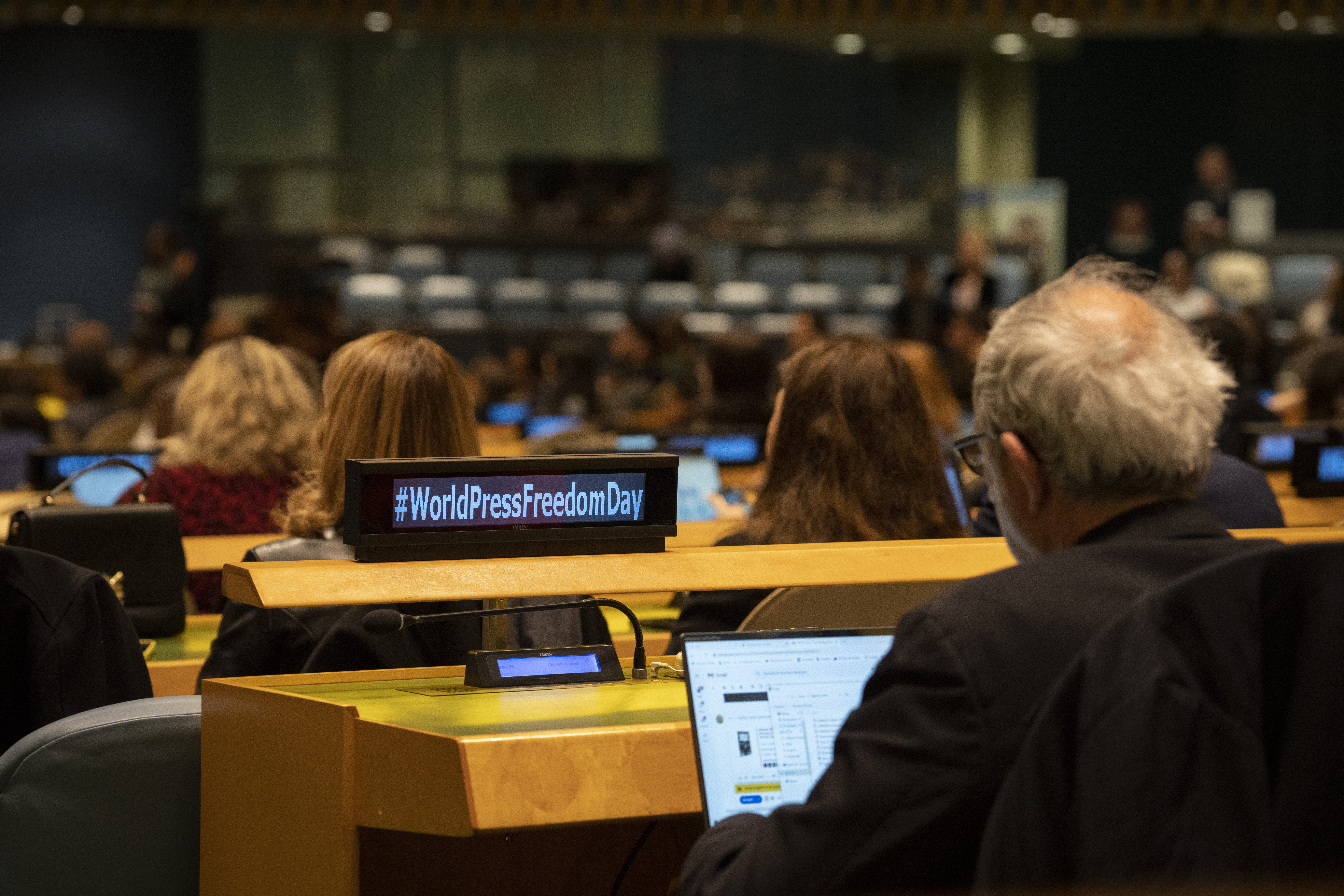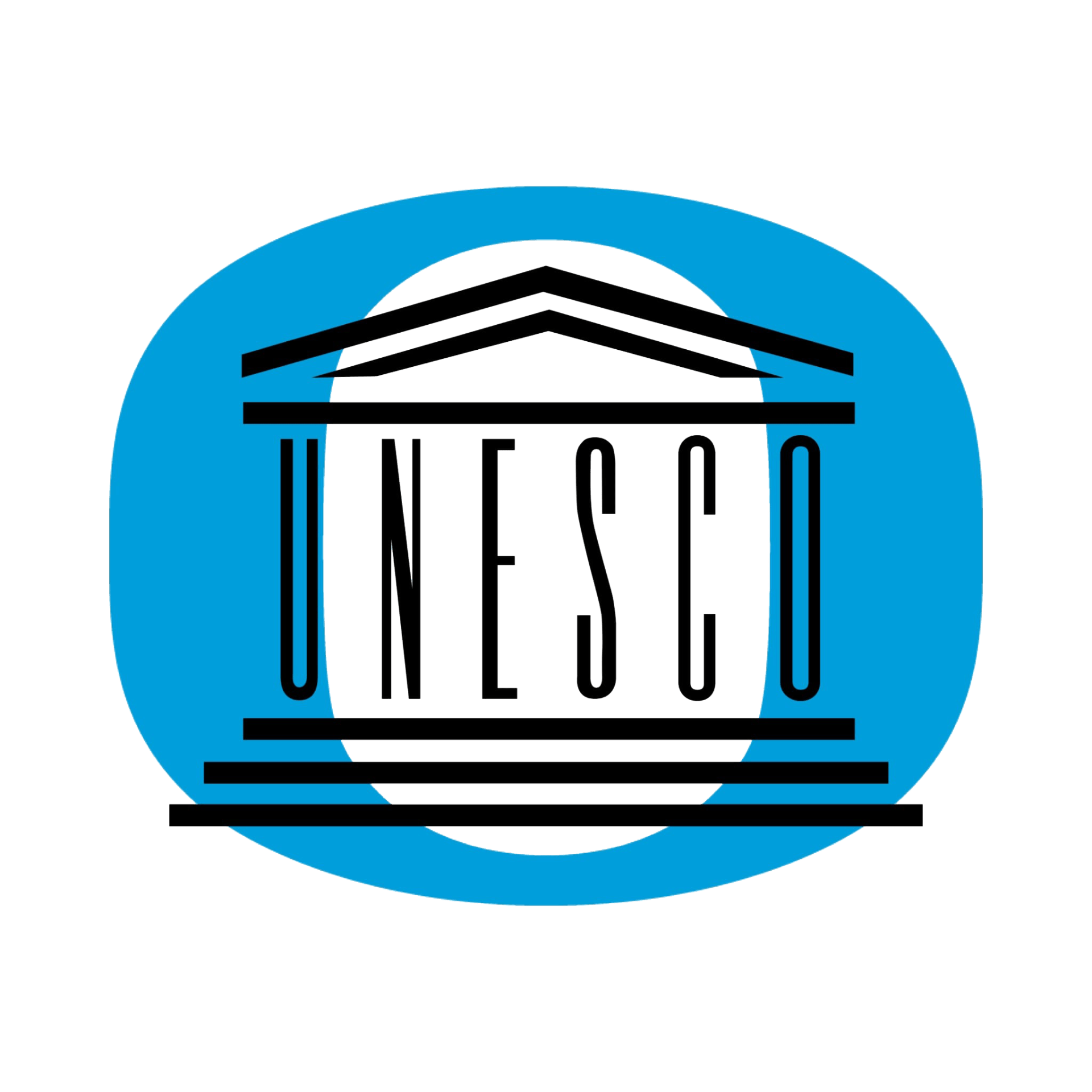Academics, journalists share concerns over the rise of global misinformation and the fate of journalism as fundamental to human rights.

NEW YORK – “There is a need for increased multi- and interdisciplinary work in our research projects,” said Dr. Tawfik Jelassi, assistant director-general for Communication and Information at UNESCO since 2021. “To very much to produce a comprehensive understanding of the complex nature of the contemporary and rapidly evolving safety threats that are facing journalists and our fundamental rights.”
As part of UNESCO’s 30th annual World Press Freedom Day conference, academics and journalists met in early May at Columbia University in New York at a hybrid event. Dr. Jelassi welcomed guest speakers with a call to action to the challenges facing journalists today.
Speakers from Ghana, Belgium, U.K, Romania, Canada and the U.S. shared their concerns and conclusions on the state of journalism amid widespread global misinformation and a lack of faith in its civic purpose from the public.
The future of the profession, according to a panel consensus, lies in the collaboration of interdisciplinary practices, ranging from legislation to behavioral science research. Dr.Vera Slavtcheva-Petkova, reader in Global Journalism and Media at the University of Liverpool, said, “It’s incredibly important that there are mechanisms in place whereby young people from all backgrounds are at the table where the biggest decisions are made in newsrooms.” She argued, “They have to be involved from the very beginning to the end to be able to understand journalism’s value and impact.”
Scholars reflected on academia’s contributions to promoting human rights and understanding the challenges faced by journalists in improving safety and media freedom in all its intricacies.
Dr. Sejal Parmer, a senior lecturer in law at Cardiff University, spoke on UNESCO’s mission of promoting international trust in newsrooms amidst the current climate of disinformation.
“The emphasis on how to empower individuals who do not have power in society ought to be much more focused,” Parmer said. “We need to look beyond the traditionally-relied-upon tools of law and straightforward policies in order to tackle the underlying drivers behind the threats of the freedom of expression that we are seeing.”
Dr. Leire Iturregui Mardaras, an associate professor from the University of the Basque Country, presented on the collaborations amongst Spanish students, academics and journalists.
“From the beginning we understood that it was essential to have interdisciplinary practices,” Mardaras said. “Collaborating internationally and across all institutions provides us with a different angle on how to tackle the issues that journalists face today.” Mardaras argued that academics should systematically acknowledge journalism’s role as a vital form of social discourse and institutional accountability.
As a self-described “optimist,” Mardaras cited her collaborative research project at the University of the Basque Country as an alternative approach to journalism’s current crisis. The academic and nationally financed research project collaborated with Spanish journalists to improve and understand their safety conditions throughout their research and publications.
Journalists and academics worldwide were adamant that freedom of expression is inextricably tied to the fate of our democracies worldwide. However, Mardaras believes that the future of journalism will be defined by the next generation of reporters.
“It’s so important to teach media literacy at a young age,” said Mardaras. “Introducing the importance of journalism and media should be at the beginning and core of our children’s education.”


weight loss steroids for sale
References:
where to Get Steroids from, http://Rack1.raincs.cc,
best steroids for size
References:
where did anabolic steroids originate from
bodybuilding steroid
References:
https://vigilanteapp.com/@deanahacking9?page=about
legal muscle building supplement
References:
git.qingbs.com
anabolic steroid cost
References:
https://git.koppa.pro
buy steroids overseas
References:
echbar.online
how to order steroids online safely
References:
https://gitea.gm56.ru
You will wish to consider your response to this drug before elevating the dose.
Typically, Clenbuterol dosages will improve as your cycle
progresses to ensure your physique doesn’t turn into used to the decrease dose, which
may cause stagnant outcomes. It’s the anabolic traits that are interesting to athletes, but as a feminine, you’ll even be
dealing with the unwanted androgenic effects. All of this leads
to some critical considerations when you’re considering of creating use of steroids for efficiency and physique enhancement functions.
There are plenty of causes girls select to not use steroids to boost their physique or increase efficiency.
Since testosterone is injectable, it is not a handy anabolic steroid for some customers.
Nonetheless, this methodology of entrance permits it to reach the bloodstream promptly, bypassing the liver,
unlike C-17 alpha-alkylated steroids. As a result, testosterone has
minimal hepatotoxic effects, which have been documented in analysis (1).
Thus, the most effective steroid for first-time customers
is one that produces substantial muscle mass while exhibiting minimal antagonistic effects.
These are extreme doses usually used in blast and cruise cycles, however 1000mg can nonetheless be tolerable
for most men in an everyday cycle. Nevertheless, if you’re sensitive to androgenic results,
hair loss and zits can become distinguished.
Conversely, whenever you implement your submit cycle therapy treatment, you will significantly minimize down your total restoration time, but there’s something extra essential.
Whereas your pure levels won’t be absolutely recovered,
you will have ensured your physique has enough testosterone for correct well being and performance
while your ranges proceed to naturally rise. Bodybuilders who cycle anabolic steroids have an increased danger of nephrotoxicity (kidney toxicity), demonstrated by high
creatinine ranges.
We extremely suggest discussing your outcomes with a
healthcare supplier who can present customized steerage
based in your unique health profile. Our staff of healthcare specialists and GMC registered doctors are licensed to
UK GMC standards. This testosterone injection dosage chart illustrates
the most typical testosterone preparations available in the the
TRT UK market. If you’ve low or very low SHBG you could are inclined to excrete testosterone at the next price and find yourself with lower ranges, so smaller
and more frequent dosing may be required.
Underground labs can basically vary from giant business setups to small garage-based labs.
You won’t know the place you’re buying from, even when suppliers promote themselves as the very best quality (it’s of their monetary
interest to do so). Different oils are often used
in compounded versions of Testosterone Cypionate; often, you
select between sesame and grapeseed. The kind of oil answer can make a big distinction to how comfortable your
injections might be (and, in some circumstances, how
painful they could be), so it’s important to listen to the variations in oils.
Testosterone Cypionate is understood to have some negative results on cholesterol.
The long half-life of Equipoise means it takes longer
to exit your system. This is one other good reason to begin with a
very low dose if it’s your first time utilizing
this steroid. It’s undoubtedly the most popular anabolic steroid with feminine athletes
of various types. Maintaining it as minimal as attainable is the
goal, and you ought to use low doses of something like Arimidex to lower estrogen.
Food Regimen is also important to advertise a dry physique on these cycles
– high protein and good fats, low carbs, and ingesting plenty
of water.
And while those features won’t be large,
they will be steady and dependable. Here’s just one instance
of a standard 12-week cycle, including ideas for beginner, reasonable, and heavy users.
But that’s just one facet of the story… The huge
consideration with these normal cycles is making progress over an extended period – years if that’s your goal.
This stack combines the best protected and effective alternate options to Anavar, Winstrol, and Clenbuterol.
The name of the game with this stack is a total focus on fat burning and getting
lean, sustaining muscle and revealing your abs, and
critically, retaining and growing your energy and endurance whereas
you’re weight-reduction plan. Another choice is to hold up that decrease dosage range of Primo
whereas stacking it with Anavar (also at a low dosage) for
mixed results.
References:
PedsElite